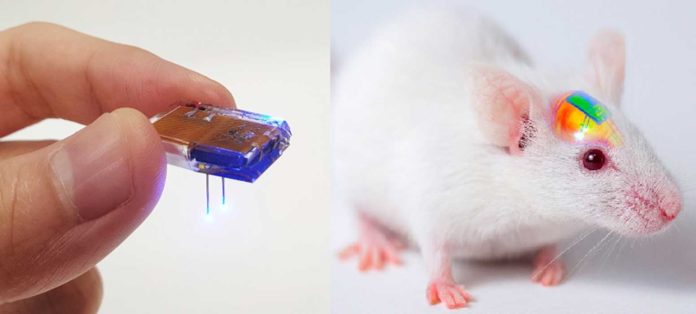Using ultra-soft and bio-compliant polymers, a group of KAIST scientists and collaborators have engineered a smartphone-controlled soft brain implant. This tiny brain implant can be recharge wirelessly from outside the body to control brain circuits for long periods without battery replacement.
To develop this implant, scientists developed a fully implantable, soft optoelectronic system remotely and selectively controlled by a smartphone. The system consists of micrometer-sized LEDs mounted on ultrathin probes to control target neurons in the deep brain using light wirelessly.
Professor Jae-Woong Jeong said, “This powerful device eliminates the need for additional painful surgeries to replace an exhausted battery in the implant, allowing seamless chronic neuromodulation. We believe that the same basic technology can be applied to various types of implants, including deep brain stimulators, and cardiac and gastric pacemakers, to reduce the burden on patients for long-term use within the body.”
To enable wireless battery charging and controls, scientists built up a tiny circuit that integrates a wireless energy harvester with a coil antenna apparatus and a Bluetooth low-energy chip. An alternating magnetic field can harmlessly infiltrate through tissue and produce electricity inside the device to charge the battery.
The battery-powered Bluetooth implant delivers programmable patterns of light to brain cells using an “easy-to-use” smartphone app for real-time brain control.
Lead author Choong Yeon Kim, a researcher at KAIST, said, “This device can be operated anywhere and anytime to manipulate neural circuits, which makes it a highly versatile tool for investigating brain functions.”
In experiments with rats, scientists demonstrated their ability to suppress cocaine-induced behavior after the rats were injected with cocaine. This was achieved by precise light stimulation of relevant target neurons in their brains using the smartphone-controlled LEDs.
Besides, the implants’ battery could be consistently recharged while the rats were acting freely, thus limiting any physical interruption to the experiments.
Co-lead author Min Jeong Ku, a researcher at Yonsei University’s College of Medicine, said, “Wireless battery recharging makes experimental procedures much less complicated.”
Jeong-Hoon Kim, a professor of physiology at Yonsei University’s College of Medicine, said, “The fact that we can control a specific behavior of animals, by delivering light stimulation into the brain just with a simple manipulation of smartphone app, watching freely moving animals nearby, is fascinating and stimulates a lot of imagination. This technology will facilitate various avenues of brain research.”
According to scientists, this technology may prompt new opportunities for brain research and therapeutic intervention to treat diseases in the brain and other organs.
Journal Reference:
- Kim, C.Y., Ku, M.J., Qazi, R. et al. Soft subdermal implant capable of wireless battery charging and programmable controls for applications in optogenetics. Nat Commun 12, 535 (2021).DOI: 10.1038/s41467-020-20803-y
